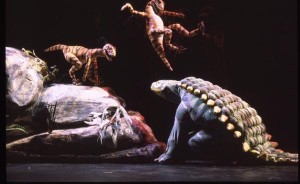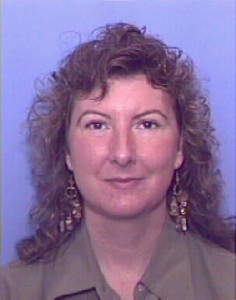
EDUCATION – Where did you go to school? What did you study? What was your experience as a student like?
Elaine attended Agnes Scott College in Decatur, Georgia. Here she initially pursued Art as her major and then added Theatre in her Junior year. She then went to the University of Georgia to pursue an MFA in Theatre. Here she learned a lot not only about scenic and costume designs, but also lighting and other cinegraphic techniques. Elaine explained how the study of the Cinographer is very European in that it ranges across all theatrical design disciplines. In the United States, the different elements and tasks of theatre are often assigned to different people who specialize in their specific techniques. In learning all of the different aspects of theatre Elaine widened her range of skills.
What did you get out of school that continues to help you today?
Elaine discussed how she was lucky to have attended a small liberal arts school because much was cross-disciplinary. She feels that this method was a model for the theatre and dance program here at Bucknell University. A few things that she feels really help her today are all of the Art and Art History background she received, as well as a solid foundation in Literature. During her time as a student she found sculpture (specifically clay work) the most appealing and she became drawn to the idea of creating pure abstract form and animating it, though she had to learn to overcome technical challenges.
If you could be a student again, what would you do differently?
In response Elaine said that she would love to be a student again, but she feels she has taken all of the necessary courses in her field. In regards to changes, she wishes she could have done high school a little differently, taken more history in addition to the art history as an undergraduate, and maybe pursued an MFA in Art as well as Theatre (claiming that the University of Georgia has a great art program). After considering, she decided she would not want to do too much differently as a student, but would love to do the same thing again.
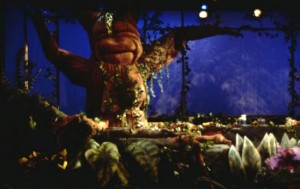
JOB – What do you do in your job? What is an average day like for you?
In regards to her job, an average day is very stretched. In addition to teaching full time, Elaine also supervises everything in scenic design for theatre as well as occasional costuming for dance. She is also involved in University committee work and engaged professionally. On top of all of this, she is an affiliated artist with the Lewisburg Theatre Ensemble, most recently working on “As You Like It.”
What do you enjoy most about your job?
Elaine likes how her job challenges her creatively on a daily basis, and that she uses art skills that she enjoys. She finds researching and conceiving the design much more engaging than actually doing it.
What do you find most challenging?
The most challenging thing, Elaine says, in regards to collaborative art form, is simply juggling it all.
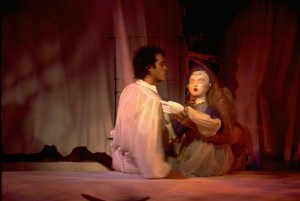
SKILLSET: What skills are most essential in your job?
The most essential skills for Elaine are her sculptural and architectural-based skillsets, used for visualizing scenic designs. In the design process, she makes construction drawings, drafting of floor plans and front elevations, as well as mockettes (as models for the full-scale sets).
How did you acquire these skills?
Elaine acquired these skills mostly as an undergraduate and some as a graduate student. She learned mechanical and hand drafting and sketching, in addition to “vector works,” which furthered her mechanical knowledge. Her interpretive skills are largely founded in her Literature courses, and her visual style is based on her familiarity with art and theatre history as well as contemporary design.
How did you get where you are today? What experiences did you have, what actions did you take, what connections did you make, that enabled you to reach the position that you have today?
Elaine came to Bucknell University soon out of graduate school on a one-year position. She found a mentor in Harvey Powers (whom she merits as a good director), and really honed her skills here. She grew up with the Lewisburg Theatre Ensemble and continues to work with this company. Elaine also kept in touch with people from graduate school, artists in the Atlanta area, and professional theatres in Atlanta.
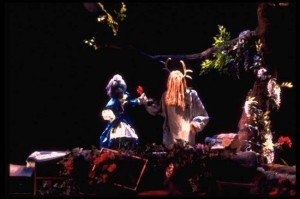
What advice would you give to the young artist who is interested in pursuing the career you’re in? How could they get started? Could you suggest any particular internships or opportunities that I might want to look into?
Staying in touch with friends is one thing Elaine believes to be very important. These are people who you really like to work with, and working with them provides continuity and offers the opportunity to take each other places. She also advises that I find collaborators whom I like to work with, these include directors, and concentrating in cross-disciplinary outreach.
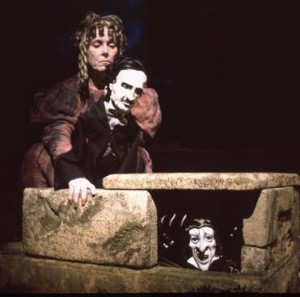
How could I further my studies in puppetry?
The University of Connecticut offers a BFA, MA, or MFA in the Puppet Arts. Elaine also recommended I watch a video in the library called Brother Bread, Sister Puppet. It is a film about the Bread and Puppet company run by Peter Schuman, a German visual artist. He creates mainly large-scale puppets with political commentary and was very influential during the Vietnam War. His farm is based in Glover, Vermont and his puppets are all handmade from recycled materials.
Atlanta, Georgia is also a major puppet center in the United States, and Elaine highly recommends I take a trip down there. She especially suggests I visit Puppets: The Power of Wonder exhibit in the Center for Puppetry Arts, which features a variety of puppets, including a few of Jim Henson’s from Labyrinth and Dark Crystal (I had previously mentioned Labyrinth being one of my favorite movies).
Are there any other puppet artists worth researching?
Elaine lists a few: Julie Taymor, Eileen Blumenthal, Bazzle Twist, and Michael Curry (whom I mentioned researching in admiring his puppetry in the Lion King Broadway production).
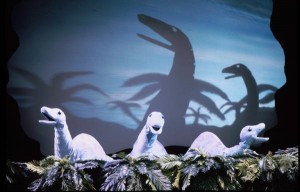
Would it be okay for my professor or other students to follow up with you later on if they have any questions? If so, what is the best way to get in touch with you?
Yes, Elaine may be contacted by her email, ewillims@bucknell.edu
Here is her website for more info: http://www.facstaff.bucknell.edu/ewillims/
